Keston Boiler Fault Codes – What They Mean, and What to Do Next
Are you stuck with a faulty Keston boiler? We’ve done the research so you don’t have to — the guide below presents the most common Keston boiler faults codes and associated problems. We’ll also list Keston boiler error codes for popular models with their descriptions at the end of the article.
Ready to give your Keston another chance? Read on!
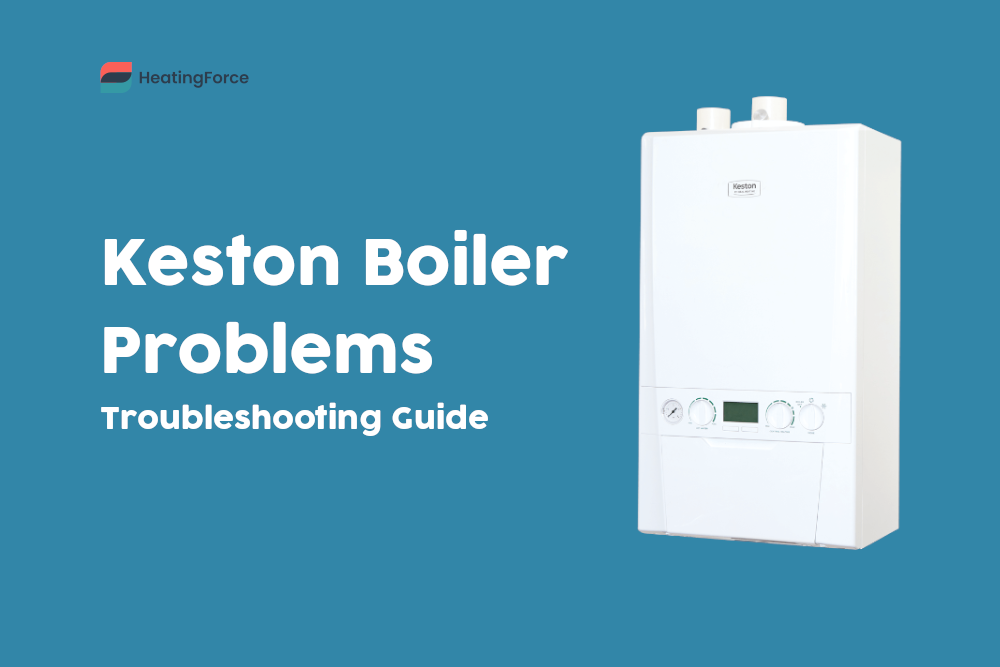
Top 6 Keston Boiler Problems
Below, we’ll list and explain the most common Keston gas boiler error codes.
#1 – Low Water Pressure: Error Codes F1/E44
The most common Keston boiler fault is low water pressure. The amount of water in your boiler and the water pressure are directly connected. So, if you add water, you’ll also increase the pressure.
You’ll be able to see this on the gauge that’s located on the front of your boiler. 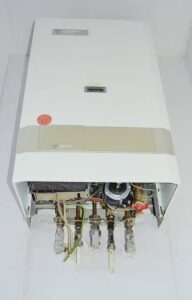
The error codes for the low water pressure fault vary depending on the Keston model you have. For instance, it would be F1 on an S30 system boiler. Meanwhile, Keston C40 boiler problems with low pressure would get the E44 error code instead.
Boilers work best at 1.3 bar of pressure. If your boiler is currently well below 1 bar, there’s a good chance that low water pressure is the problem.
You need to determine if your boiler is losing pressure, or simply HAS low pressure. If it’s losing pressure constantly, there’s a leak in the heating system.
You’ll want to have a heating engineer find out why your boiler is leaking water before topping up the pressure. If you don’t, water could be leaking onto floorboards, plaster, and even boiler components.
The Fix
Assuming you have found and fixed the leak, or you simply need to top up your boiler’s pressure, you’ll need to locate the external filling loop.
This a small braided hose that’s located below your boiler. There’s a valve on the filling loop that will allow water to enter your heating system. As you open it, you’ll see the pressure rise. Aim for 1.3 bar, but up to 1.5 bar is fine.
If you accidentally overfill your boiler, you can drain water (and pressure) from the system via the drain cock. If you can’t locate the drain cock, you can release pressure (and water) via the radiators using a drain key. When bleeding radiators, remember to protect carpets and walls and have a container ready to catch the water that escapes.
#2 – Water Pressure Too High: Error Code E40
If your pressure gauge is above 1.5 bar, or even worse, in the red area of the gauge, your boiler pressure is too high. Excess boiler pressure is unnecessary, especially as it causes excess strain on parts such as the heating pump’s seals and soldered copper joints.
On Keston combi boilers, you can expect to see the E40 fault code in the event of high pressure.
The first thing is the determine whether your boiler’s pressure is always high, or it’s rising during boiler operation. If it’s always too high, you need to reduce it.
If your boiler rises by 0.2-0.3 bar as it heats up, that’s normal. As parts heat up, they expand, increasing boiler pressure. It should drop as the boiler cools down.
A rise of 0.5-1 bar might indicate that the auto air vent or pressure release valve have failed. These are designed to release excess pressure. So, if they fail, that pressure is going to be sealed in the system.
The Fix
If you’re seeing a dramatic rise in boiler pressure during operation, you’ll need to get a Gas Safe engineer to inspect the air vent and PRV.
However, if the pressure doesn’t rise significantly during operation, you’ll need to remove excess water from the system.
Pressure can be released via the heating drain cock. If you can’t find the drain cock in your property, the easy solution is to drain water via the radiators.
Each radiator has a bleed valve. By using a bleed key, you’ll be able to release water and reduce the pressure. Aim to get the pressure to 1.3 bar when cold. If you drain too much water from the system, you can simply top up the water using the external filling loop on your boiler.
#3 – Boiler Won’t Fire Up: Error Codes F3/E05
If your Keston boiler is not firing up, there may be a fault with your fan. Again, the error codes differ depending on the model: you’ll see an F3 error code on an S30 system boiler, and E05 fault on a C36 combi.
The fan on your boiler creates a small draught. This allows dangerous gases to be expelled via the flue. Your boiler won’t ignite unless the printed circuit board recognises the fan running.
Essentially, if a faulty fan is the problem, the boiler won’t sound like it’s even trying to ignite.
But the problem is, the fan can also be the fault if it’s running too slow. A slow fan won’t create a big enough draft to expel the flue gases. The air pressure switch (which senses this draught) notices that the boiler is unsafe and locks it out.
The Fix
Unfortunately, there’s no simple DIY fix. You shouldn’t be working on your boiler unless you are registered with Gas Safe.
So, you’ll need to call a Gas Safe registered engineer. They’ll be able to diagnose the problem with the fan. If the fan needs replacing, this could cost £250 and upwards (including parts and labour). You should consider protecting your boiler with a comprehensive boiler cover plan to avoid paying such steep repair costs after future breakdowns.
What kind of fuel does your boiler use?
Fixed price online with next day installation
#4 – Boiler Works Intermittently, Or Doesn’t Respond At All: Error Codes E09-E12
If you’ve noticed your boiler working intermittently, the problem here is likely to be the control panel and Printed Circuit Board (PCB). The PCB makes sure that all electronic boiler parts are working in concert. So, when this part breaks, a boiler won’t work the way it should.
You might have noticed your boiler:
- Starting up or turning off when it shouldn’t
- Taps and radiators constantly going hot/cold
- The display panel LEDs flickering on and off
Anything that seems unusual is likely to be connected to an electronic fault, and one that’s linked to the PCB. In these cases, you’ll see error codes E09, E10, E11 ,and even E12 on C40 and C55 combi boilers.
The Fix
A boiler engineer will need to test the PCB to check that this is the problem. They’ll use a multi-meter, which can determine whether the PCB is getting power.
Besides checking connections and wires to/from the PCB, there’s not much else that can be done other than a replacement. And, a PCB replacement could cost around £500.
Before having a new PCB fitted on your Keston boiler, make sure there are no other faults.
Most damaged PCBs are linked to boiler leaks. It could be that the main fault with your Keston boiler is a leak, and the broken PCB is a by-product. You’ll want to get this fixed before spending big money on a PCB.
You could also find that a different issue altogether is causing your PCB to shut the boiler down. For instance, if the flow and return sensors are faulty, they’ll communicate erroneous flow and return temperatures to the PCB. If the boiler flow temperature is seen as being too high, the PCB may trigger a lockout.
It’s also worth assessing the overall condition of your boiler. There’s little point investing £500+ on a boiler that’s out of warranty and is continuing to deteriorate. Instead, we’d suggest investing money in installing a new boiler altogether. Getting a replacement boiler quote will help you determine what the most cost effective route is going to be long-term.
You can get an online new boiler quote from Heatable in 90 seconds by filling in an anonymous questionnaire.
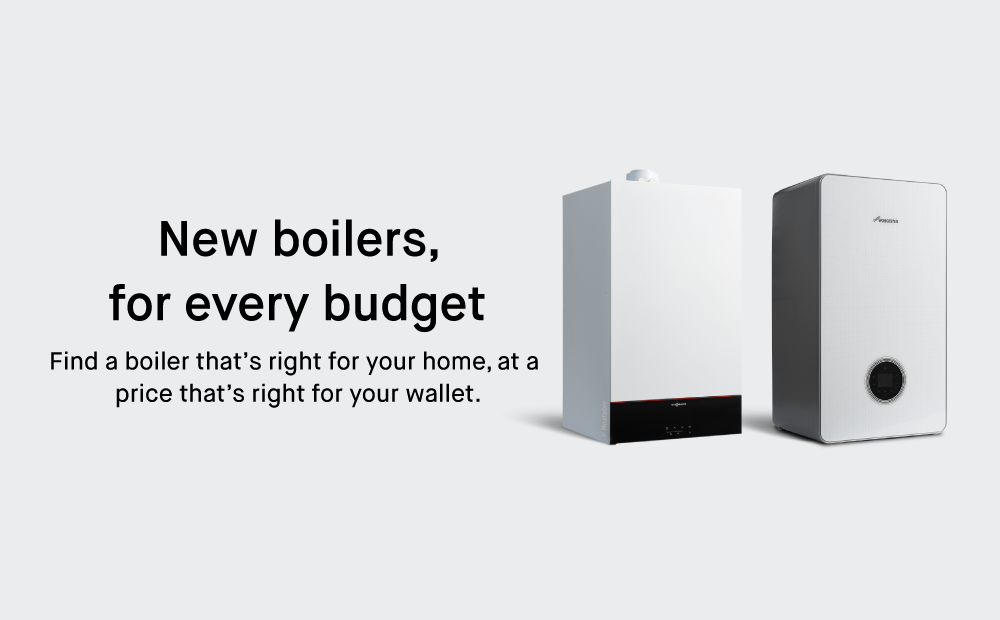
#5 – Boiler Won’t Ignite: Error Codes E01/E02
Ignition failure is another frequent problem with Keston boilers. For the C36, it will show a E01 fault code, whereas the C40 and C55 combi boilers will show the E02 fault code.
Ignition failures are not particularly specific. They could be related to:
- Fan faults
- Blocked air flow (flue)
- Blocked condensate pipe (likely in freezing temperatures)
- Moisture on the ignition lead and probe
- Gas supply issue
The Fix
The most likely problem is a gas supply issue. In winter months, regulators on gas meters can freeze. When they do, they can restrict the gas flow to the boiler.
However, when it’s not cold, the gas valve is the likely culprit.
Gas valve operation may be hindered if the valve gets stuck due to age and wear and tear. If the valve sticks closed, it won’t be giving the boiler’s burner the amount of gas that it really needs. The PCB recognises this issue and locks the boiler out, displaying an error code.
You’ll need to get a Gas Safe engineer to free the valve and check its overall condition. If the valve can’t be freed and is in poor state, a replacement can be fitted. This will cost roughly £250.
#6 – No Hot Water / No Heating
If you have no hot water, no central heating, or radiators are heating up slightly even when the heating is off, it’s likely the diverter valve is the cause.
The diverter valve helps a combi boiler switch between hot water and heating. If it’s sticking, as you call for hot water, it will be letting by some of this heated water into radiators, and vice versa.
The Fix
Similar to a gas valve fault, a stuck diverter valve can sometimes be freed.
However, it’s much more likely that you’ll need a replacement diverter valve instead. Typical prices for a diverter valve replacement on Keston boilers are around £350, although the number will fluctuate depending on the boiler model.
AWith these sort of repair costs for your Keston boiler, it might be worth considering a replacement. You can get a price on-screen from Heatable in less than two minutes using their handy clickable form.
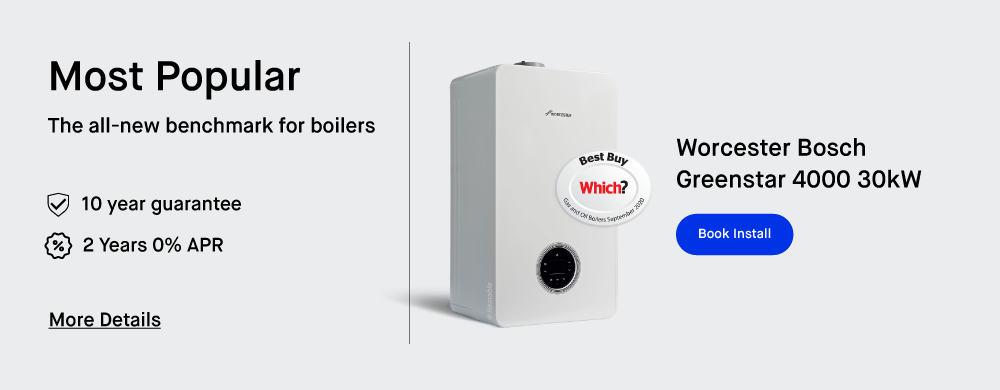
Full List of Keston Boiler Fault Codes
Above, we’ve described the most common Keston faults. And below, we’ll list, and explain, all the possible fault codes your C36 and C40 Keston boilers could show on their display screens.
Keston C36 Error Codes
| Boiler Error Code | Possible Causes Behind Error Code |
| E01 | Ignition failure — the boiler has attempted to light 5 times and not succeeded — check the gas supply is on |
| E02 | False flame — possibly a problem with the power supply |
| E03 | Boiler overheat – check that any valves to the heating circuit have not been shut down, no air in the system and that the water pressure is correct |
| E05 | Fan failure — boiler cannot detect fan rotation — check fan operation and both connectors onto fan |
| E07 | Flue overheat — check combustion and flue temperature vs. return temperature — the flue temperature should be no more than 10C above return temperature. Possible heat exchanger fault. |
| E08 | Flame circuit error — possible control box fault |
| E09 | Valve drive error — possible gas valve or control box fault |
| E10 | Control box errors — possible faulty control box |
| E11 | The automatic test for calibration of flow and return sensors has failed — check both flow and return sensors are located on the correct pipes and are producing the correct readings |
| E12 to E22 | Control box errors — possible faulty control box |
| E23 | Water filling error — check water pressure sensor |
| E24 | Water pressure lost 4 times in 24 hours — possible leak, check system and boiler |
| E25 | Control box errors — possible faulty control box |
| E26 | Flame drop out — check for obstruction of the flue and/or air terminals, blockage/freezing of the drain pipe or a low gas supply (LPG). |
| E30 | Flow sensor short circuit — check connections to flow sensor |
| E31 | Flow sensor open circuit — check connections to flow sensor are in place |
| E32 | DHW sensor short circuit — check connections to domestic hot water (DHW) sensor |
| E33 | Domestic hot water (DHW) sensor short circuit — check connections to DHW sensor are in place |
| E34 | Mains supply voltage < 180V — may be a problem with your power supply |
| E35 | Mains supply frequency incorrect — may be a problem with the power supply |
| E37 | Water pressure error — increase the system water pressure |
| E38 | Reset key fault — replace fascia PCB |
| E40 | Water pressure too high |
| E41 | Communication error between fascia and control box — check cables |
| E43 | Return sensor short circuit — check connections to return sensor |
| E44 | Return sensor open circuit — check connections to return sensor are in place |
| E45 | Flue sensor short circuit — check connections to flue sensor |
| E46 | Communication error between fascia and control box — check cables |
| E99 | Flue sensor short circuit — check connections to flue sensor are in place |
Keston C40 System Boiler Error Codes
| Boiler Error Code | Possible Causes Behind Error Code |
| Enn | Fault causing a boiler shutdown |
| E00 | Flame detected when not expected — check boiler earth and probe condition |
| E02 | No ignition after restart — check gas supply, gas valve operation and ignitor electrode spark generation |
| E03 | Gas valve faulty or not connected |
| E04 | Power has been reset whilst boiler was in lockout |
| E11 | Internal electronics error — rest or replace control box |
| E18 | Flow overheat — check water circulation |
| E19 | Maximum return temperature exceeded — check circulation |
| E25 | Flow temperature increased too quickly — check water circulation |
| E30 | Difference between flow and return temperatures too high — check circulation. |
| E31 | Flow thermistor short circuit — check/replace connections/thermistor |
| E32 | Return thermistor short circuit — check/replace connections/thermistor |
| E36 | Flow thermistor open circuit — check/replace connections/thermistor |
| E37 | Return thermistor open circuit — check/replace connections/thermistor |
| E44 | Low water pressure |
What’s Next?
Thanks for reading our 5-minute guide to Keston boiler problems. If you’re looking for further information on boiler faults, check out our boiler fault finding guide here. Are you experiencing a boiler problem or seeing error codes not listed above?
Or, do you have any other questions? Please leave a comment below and we’ll respond as soon as we can.
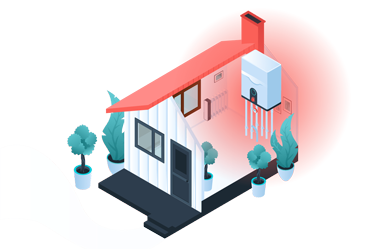
Hi, how I do release an air lock in the pump in the Keston boiler?
The temperature fluctuates, where I get warm water (not hot water) and the radiators don’t get hot.
thanks!
It’s quite easy. Switch it on and unscrew the big screw in the middle. Air will come out and then you screw it back in. That’s it, air is out of your system.
Sorry, this may be a stupid question but my Keaton boiler was recently serviced and it sounds like it is “on” all the time, even when the flame is not on. Is that right? Should it be making a sound all day?
Hi Ed, no it’s not. There’s absolutely no reason for a boiler to be “on” all the time. Call the guys again?
Thank you – I will!
Hello Alex,
My boiler, not working for a long time, started humming again a few days ago and it displayed all sorts of temperatures, then displayed the code E01 and has now settled for the letters LU, any idea what LU means? I know what E01 means (I called an emergency gas service shortly after hearing the boiler and the man who came switched off the gas from the mains as he could not turn my Keston C36 boiler off, hence the E01 fault code appearing). Many thanks in advance for your help.
To be honest, never heard of a LU error. I’m sorry.